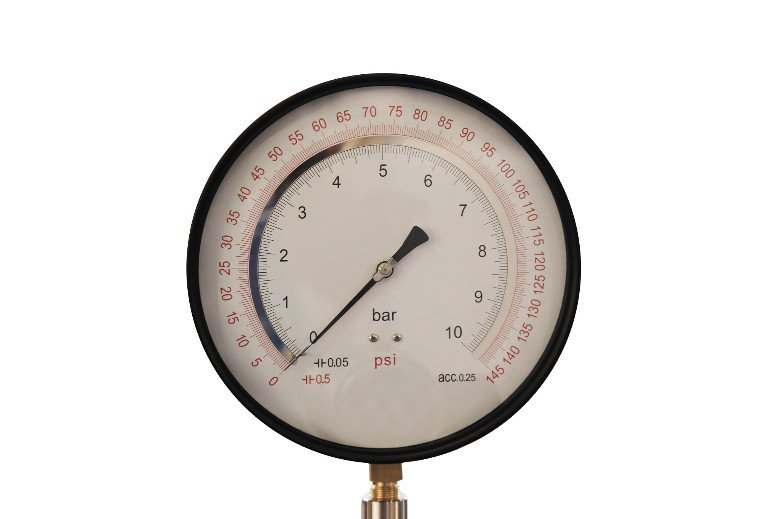I have some very clear memories of my father using a compression tester on the family cars. But it wasn’t until I attended an automotive technical school that I got well acquainted with this valuable tool.
Many younger people may not know how important this tool is. They may believe that if the car isn’t burning oil out the tailpipe that it must be OK.
That is certainly one shocking way to discover that your motor has some serious problems. But did you know you can use a compression tester to find out issues thousands of miles before your car starts burning oil?
This is an extremely useful tool for anyone who wants to or plans to work on their own vehicles. Nothing else will help to give you a glimpse of the condition of a car motor than a compression tester.
There are hundreds of them on the market. How do you pick the best compression tester? I’ve done all the hard work for you here.
OTC Deluxe Compression Tester Kit
I’m not sure how long OTC has been around, but I remember seeing these when I was in automotive school.
This is the deluxe kit. It also has a carrying case for protection along with fittings and adapters to fit nearly every vehicle on the road today. It includes 16mm threads that are common on the Ford Triton motors.
I love the case, which protects all the accessories. You will notice right away if you have left an adapter behind. You won’t be nervous about damage if you have to leave this precious item in the back of the truck.
It’s important to note that this is only for gas engines, and it will not work on diesel motors.
Many users note that this worked beyond their expectations. Some say it fit the newer, hard to reach models, such as the Ford 5.4 3V motors, which have a very deep well design.
Pros
- All the fittings are nickel plated to prevent corrosion.
- The hose has an extra-long reach of 25 inches for easy reading.
- The compression gauge itself offers dual readouts of 0-2100 kPa and 0-300 PSI.
Cons
- The warranty is one year, which seems to be the standard but it should be longer in my opinion.
- I did hear some users complain that the adapters can become stuck inside the spark plug hole on the engine. That can cause a real problem.
- Others say that the check valve on their compression gauge failed multiple times.
This little kit is so handy, you can use it for just about any motor out there, including motorcycles and chain saws! This is definitely the professional version that you will be really happy to own.
INNOVA Compression Tester
Time to face the facts. Sometimes we simply don’t have all the money in the world to spend on tools. If that’s the case for you, the INNOVA compression tester is what you want.
This is a four-piece set, including the gauge, a 14MM adapter, a 12MM adapter, and a 15-inch rubber hose. That’s a fairly decent setup for one low price.
This compression tester is color-coded and it can read from 0-2100kPA and 0-300PSI.
Compression testers don’t need to have a lot of adapters if one of the adapters in this kit will fit your vehicle.
Most users find that this does the trick when they just want some information on an engine. Some users say it worked far better than they expected.
You will find some users saying that this compression tester didn’t work at all or it only worked a few times before it broke. My response is that it’s important that you take care of the tool. Most tools fail from a lack of proper care.
Pros
- The 2.5-inch dual reading dial head is easy to read.
- This will also work on smaller motors, such as on snowmobiles, or lawnmowers.
Cons
- It lacks the variety of adapters that other kits have. You’ll need to double check it will fit your spark plugs and engine.
- This one doesn’t come with a case. That means it will be up to you to find a suitable container to prevent damage to the dial and to prevent losing the adapters.
For this incredibly low price though, I don’t see how you can go wrong.
BlueDriver Compression Tester Kit
Motorcycle and ATV engines are even more varied when it comes to spark plug sizes than cars are! That would be why this kit is the perfect compression tester for those with motorcycle, scooters, or ATV engines.
This compression tester kit has 8 pieces. It includes 4 spark plug adapters, a 16-inch rubber hose, a 45-degree shaft, and a straight shaft. And of course the carrying case that I feel is so important.
The gauge on this compression tester is perfect for smaller engines. It has three reading capacity, 0-300PSI, 0-20bar, and 0-21kg/cm.
The BlueDriver name isn’t as well- known as others such as OTC. But you can tell once you handle this item that it is a quality made compression tester.
Most users say that this engine compression tester worked well on everything from a motorcycle to a boat motor. That is the advantage of having adapters ready at hand! No need to head out to the store to find an adapter that fits.
Pros
- The triple reading gauge is very valuable when taking readings on smaller engines.
- You can work on most small engines with the various adapters it comes with.
Cons
- One user said it didn’t work out of the box. But that’s what warranties are for. (By the way, the warranty is one year).
I have seen almost no user complaints about this tester. If you’re working on ATV’s or motorcycles, this is the compression gauge for you.
8MILELAKE Compression Tester
For those of you who do most of your testing on smaller engines such as lawnmowers, go-karts, weed-eaters, and chain saws, this is the best kit for you.
This is one of the best setups. It has two rubber cones for quick checking compression, 6 different adapters with an O ring, an easy to read, large 3-inch compression gauge with duel color scale, and an 18-inch hose.
A few users said that the product was either missing pieces or was broken right out of the box.
That’s what the warranty is for. Things do go wrong at the factory.
The majority of users say they use this every day and this is the best compression tester out there for the money. Especially for small engines.
Pros
- With all these adapters, this will work on almost any engine that you can find.
- Did I mention that it has a nice carrying case? I think all compression gauges should!
- This tester kit comes with a one-year warranty like nearly all other engine compression testers do.
Cons
- A few users complained that this compression tester could not withstand readings of more than 150PSI.
This compression tester kit has everything you could want. Of course it has that lovely little case, so you will always know when something is missing, as well as protecting the dial.
BETOOLL Cylinder Compression Tester
You may have noticed that many of these compression testers don’t work on diesel or two-stroke engines. This is the best compression kit for two-stroke engines.
Yes, it has a nice little carrying case, which automatically gives it a good rating in my book. In addition to that, you can make sure that all 8 pieces in this kit are always returned to their proper location.
Betooll HW0130 comes with 4 brass adapters, a dual-range scale which reads from 0-300PSI, two rubber cones for quick compression test readings, a 16-inch rubber hose, and the easy to read 3-inch gauge.
Pros
- I like this compression tester because the hose and tip seem to be very well made and resilient.
- It also came with an excellent “how-to” guide that explains how to use it.
Cons
- A few users complained that it was very inaccurate. But without another compression gauge to compare, it’s hard to know how they knew it wasn’t reading correctly.
These complaints were the exception. Almost all users stating that this was the best compression kit they had owned and that it had paid for itself the first time they used it.
What is a compression tester?

For discovering the state of the internal parts of a motor, a compression tester cannot be beaten.
A four-stroke engine uses the intake to suck in air and vaporized fuel mixture. The valves closes and compression, or explosion, occurs when the spark plug ignites the fuel and air. This causes the piston to be forced down very hard, which is what gives power to the motor. The final stroke is the exhaust stroke. This removes the exhaust fumes from the combustion chamber.
As engines age, the seals, valves, and rings that keep the compression chamber tightly closed start to fail. This allows for leaks. This will show on a compression tester.
A compression tester will let you know how much compression is being created by each cylinder. Although engines will vary, a compression reading should be more than 100 PSI. There should be no more than a 10 percent variation between the highest reading on an engine and the lowest.
What is a good compression test reading?

This will vary with each engine. For example, you cannot expect to get a 200 PSI reading out of a lawnmower engine.
For the majority of cars and trucks on the road today, a reading of 135 PSI or higher is considered to be excellent.
Even a reading of 100 PSI or higher is still good as long as all cylinders have no more than a 10 percent difference between them.
The advantage of using a compression tester before each tuneup is that you can catch problems. You can find bad piston rings or excessive carbon buildup on valves. You could even a failing head gasket before they become a major problem and cause further damage to the motor.
Some mechanics believe that a 20 percent variant across cylinders on an engine with high mileage is acceptable. Others say that for high mileage motors, as long as all readings are over 100PSI, the engine is considered acceptable.
What happens if the engine compression is too high?

While super high compression might seem like a good thing, it usually isn’t.
Yes, a higher compression does offer a higher engine efficiency rate. But this stronger “explosion” means that the motor needs to be built heavier to withstand this pressure.
If the pressure on your motor has suddenly increased, you might notice a pinging or knocking sound, especially during acceleration. This could mean that one of the systems or sensors on your car has failed.
Check your engine with an OBD2 scanner for codes to see if this has occurred. Most computerized engines today are tightly controlled to monitor exhaust emissions. They try to prevent what used to be called knock or pinging in the motor.
Higher compression readings often come from carbon deposits. Left unchecked, they can lead to the motor wearing out faster.
This is another reason why it is so important to do a compression test on each cylinder before every tuneup.
Will a compression test show a bad valve?

Yes, it will.
If only one cylinder has low compression, perform what is known as a wet compression test.
Compression tests are done “dry”, that is, with nothing added to the cylinder. Spark plugs are removed, the compression is taken at each cylinder, and the readings noted.
If one cylinder reads lower than the others, squirt a bit of motor oil into the cylinder and then retest it.
By squirting oil into the cylinder, you temporarily seal the piston rings, filling in the small gaps between the cylinder wall and the piston rings.
If the wet compression test does not change the reading, then you know the rings are not the problem. That means an intake or exhaust valve has failed. Inserting a probe or camera into the cylinder will reveal which valve has failed, or if both are to blame.
Conclusion
A compression test will tell you so much about the internal motor of your vehicle! You can discover if your engine has a hole in the piston, carbon buildup on the top of the piston, a failing head gasket, or bad intake and exhaust valves.






